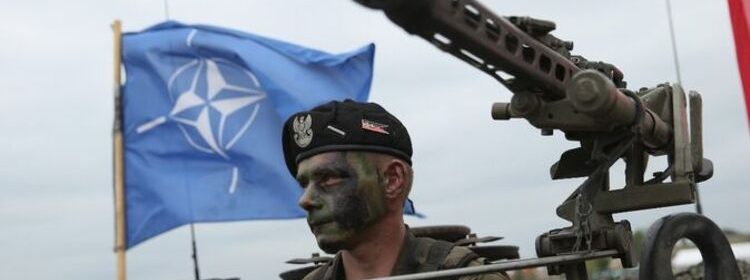Israel urged to join NATO as Turkey seeks ‘golden prize’ of EU membership

Former NATO commander rules out Crimea returning to Ukraine
We use your sign-up to provide content in ways you’ve consented to and to improve our understanding of you. This may include adverts from us and 3rd parties based on our understanding. You can unsubscribe at any time. More info
Israel took a step closer to NATO in 2014 when Tel Aviv was granted the so-called ‘Major Non-NATO Ally’ classification which added additional support on both defence and energy infrastructure. Further steps have been taken in 2016 when Israel was allowed to launch its liaison office at NATO headquarters and in 2017 after it formally signed a cooperation agreement with the defence bloc.
Writing in the Brussels Times, EU advisors Alexandre Krauss and Nuno Wahnon-Martins said: “With a solid democracy and values driven society, Israel military capabilities would fit perfectly the present and future needs of the Alliance.
“The military quality hardware, technology or intelligence would enhance NATO’s existing capabilities.
“In a moment where NATO’s budget burned share is at the centre of many debates, Israel’s military budget is near the singular value of 4.5 percent GDP.”
However, Krauss and Wahnon-Martins warn one of NATO’s articles could make war in the Middle East more likely if Israel ascended into the bloc.
They explained: “One of the core, if not the main, debates about an Israel NATO membership, will always be focus on NATO’s Article 5 (collective defence) activation over a potential attack from Iran or any of Iran’s proxies, such as the Hezbollah.
JUST IN: Kamala Harris blasted as polls show crushing new disapproval rates – ‘An embarrassment’


“The odds of such an attack are high and such an event would put the Alliance in a difficult position as this could prompt an armed conflict of years in the Middle East and even some regions in North Africa.
“It is also clear that the full membership would not depend only NATO members, especially if Turkey will not veto that same membership, but also in Israel willingness in joining it.”
However, the pair also wrote about Turkey’s position in NATO and Ankara’s bid to join the European Union.
Turkey’s potential membership of the Brussels bloc played a somewhat significant role in the UK’s 2016 Brexit referendum.
In a pamphlet produced by the Vote Leave campaign, Brexiteers warned Turkey was among five countries “lined up to join” the EU.
A separate poster said: “Turkey, population 76million, is joining the EU. Vote Leave – Take Back Control.”

Even Boris Johnson, who proudly talks about his Turkish ancestry, made comments about Ankara’s bid.
Speaking to then BBC host Andrew Marr, the Prime Minister said: “Frankly I don’t mind whether Turkey joins the EU, provided the UK leaves the EU.”
He added: “It is the Government’s policy that Turkey should join the EU.”
However, Mr Johnson has since denied making any remarks about Ankara’s plans to join the Brussels bloc.
Writing about Turkey, Mr Krauss and Mr Wahnon-Martins said: “It is almost two decades since Recep Tayyip Erdoğan became Turkey’s strongest political actor.
“[It] all started with a then committed Prime Minister bridging and enhancing Turkey’s challenging relations with the European Union seeking, ultimately, the golden prize – an EU membership.”
They added: “However, corruption, freedoms obliteration or democratic backlashing followed by an unprecedented purge across Turkey’s military, judicial and bureaucratic dimensions after a failed coup, helped to flatten what Erdogan had achieved over one decade at the eyes of Turkey’s international partners.”
DON’T MISS:
‘We won’t destroy ourselves’ Hungary’s Orban hits back at Zelensky [REVEAL]
Ukraine poised to unleash deadly new weapon on Putin’s troops [INSIGHT]
Kremlin forces humiliated after Stalingrad tank division destroyed [SPOTLIGHT]


But Turkey, which the pair describe as “quasi-autocratic”, damaged intra-NATO relations by announcing in July 2019 they would purchase Russia’s S-400 missile system.
Washington was said to have been so frustrated by the move that they removed Turkey from the F-35 development programme.
Despite concerns about Ankara’s recent decisions, Krauss and Wahnon-Martins explained: “It is true that Turkey’s powerful military – NATO’s second largest army with over 350,000 military personnel and vast military capabilities – and unique geo-strategic position incline everyone not to take the country of the Alliance.
“In fact, this would only prompt fears of a Turkey aligned with Russia and/or Iran. A Turkey flying solo would also mean a potential new member of the ‘Nuclear Club’.
“Finally, the European Union and NATO would have an extremely difficult eastern border to engage with.”
Source: Read Full Article
